|
The “Taipei in the Making” project endeavors to digitize and create a value-added information retrieval system for parliamentary documents authorized by Taipei City Council. The outcome includes 255,982 digitalized pages of parliamentary journals, 266,644 pages of parliamentary gazettes, and over 65,000 minutes of the Council Chamber video recordings, dating back to 1969. The project builds a web site with a multitude of search capacity and provides an instant messaging reference service based on the digitized content. It demonstrates a holistic view of the representative democracy of Taipei City. It further illustrates the collective memory of the relationship between local politics and social development in Taiwan.
Inception of the first public hearing regulation in Taiwan(1984/9/6)
 The statute “Taipei City Council Public Hearing Regulation,” the first statute regulating hearings in our country, was passed during the sixth session of the fourth term, which was held on Sept. 6th, 1984. Public hearings were often held since then to obtain insight from experts in various fields, whenever the committees needed to investigate important issues. By allowing different voices to appeal to the council directly, it greatly improved citizen participation in politics.
The statute “Taipei City Council Public Hearing Regulation,” the first statute regulating hearings in our country, was passed during the sixth session of the fourth term, which was held on Sept. 6th, 1984. Public hearings were often held since then to obtain insight from experts in various fields, whenever the committees needed to investigate important issues. By allowing different voices to appeal to the council directly, it greatly improved citizen participation in politics.
The first public hearing held on vending machine management(1984/10/6)
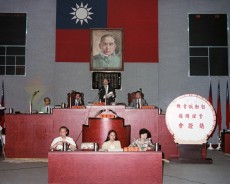 The rising popularity of vending machines began to cause some problems, prompting the City Council to hold a public hearing on vending machine management. This was the first official public hearing held since the statute was passed. Vending machine operators, police officers, and scholars discussed placement locations, and whether to establish regulations for them, providing statements and responses in turn. Chairman Chang Chien-Pang, the moderator of the hearing, said that conclusions would not be made in the public hearing. Instead, the hearing record will be given to the committee for reference.
The rising popularity of vending machines began to cause some problems, prompting the City Council to hold a public hearing on vending machine management. This was the first official public hearing held since the statute was passed. Vending machine operators, police officers, and scholars discussed placement locations, and whether to establish regulations for them, providing statements and responses in turn. Chairman Chang Chien-Pang, the moderator of the hearing, said that conclusions would not be made in the public hearing. Instead, the hearing record will be given to the committee for reference.
Opposition council members sit in silent protest over controversy raised by acting mayor(1985/4/23)
 Mayor Yang Chin-Tsung was hospitalized for illness, and his duty was taken over by City General Secretary Ma Chen-Fang, who represented him in the inquiry. Seven opposition councilmen, believing that it is against law for the general secretary—a commissioned official—to act as acting mayor, refused to continue the inquiry and sat in their seats in silent protest. The opposition councilmen also indicated that Mayor Yang had already been hospitalized for over seventy days. The welfare of the citizens must not be neglected despite appropriate concerns for his health. They further requested that the office of the mayor be opened to election by citizens.
Mayor Yang Chin-Tsung was hospitalized for illness, and his duty was taken over by City General Secretary Ma Chen-Fang, who represented him in the inquiry. Seven opposition councilmen, believing that it is against law for the general secretary—a commissioned official—to act as acting mayor, refused to continue the inquiry and sat in their seats in silent protest. The opposition councilmen also indicated that Mayor Yang had already been hospitalized for over seventy days. The welfare of the citizens must not be neglected despite appropriate concerns for his health. They further requested that the office of the mayor be opened to election by citizens.
Roll call test run during council session(1985/9/4)
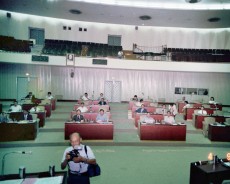 As it was close to the date of the fifth term elections, the attendance rate of the council members was awfully low during the eighth session of the fourth term. In response to the low attendance and the fact that there were more members who slipped away after signing in than who stayed to participate in the meetings, the council decided to start testing a new roll call system. Every morning at 9:30, or whenever half of the councilmen are in attendance, the names of councilmen inside the hall are noted and photographed for the record, to prevent members from slipping away. The first day of the test run was successful, and set the record of timely session commencement. As it was the councilmen’s duty to attend the sessions, public opinion still demanded that they attend of their own accord.
As it was close to the date of the fifth term elections, the attendance rate of the council members was awfully low during the eighth session of the fourth term. In response to the low attendance and the fact that there were more members who slipped away after signing in than who stayed to participate in the meetings, the council decided to start testing a new roll call system. Every morning at 9:30, or whenever half of the councilmen are in attendance, the names of councilmen inside the hall are noted and photographed for the record, to prevent members from slipping away. The first day of the test run was successful, and set the record of timely session commencement. As it was the councilmen’s duty to attend the sessions, public opinion still demanded that they attend of their own accord.
As the National Assembly power grab provoked student protests, the City Council joined in the denunciations(1990/3/20)
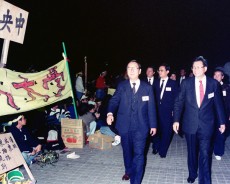 The National Assembly was the parliament of the ROC, which exercises important duties such as presidential elections and constitutional amendments. In 1990, the National Assembly increased the terms of service for its own newly elected members, gave itself the power to hold council annually, and attempted to seize power and undermine the constitutional system. Multiple local councils, including the Taipei City Council, made statements to denounce the National Assembly. The actions of the National Assembly caused uproar throughout Taiwan, and college students rose in protest and demanded multiple democratic reforms, including the abolishment of the National Assembly. They gathered in Chiang Kai-Shek Memorial Hall on hunger strikes. The Taipei City Council supported the protest. Representing the council, the chairman visited the protestors in person to express concern for the students, and hoped to protect constitutional foundations through democratic means.
The National Assembly was the parliament of the ROC, which exercises important duties such as presidential elections and constitutional amendments. In 1990, the National Assembly increased the terms of service for its own newly elected members, gave itself the power to hold council annually, and attempted to seize power and undermine the constitutional system. Multiple local councils, including the Taipei City Council, made statements to denounce the National Assembly. The actions of the National Assembly caused uproar throughout Taiwan, and college students rose in protest and demanded multiple democratic reforms, including the abolishment of the National Assembly. They gathered in Chiang Kai-Shek Memorial Hall on hunger strikes. The Taipei City Council supported the protest. Representing the council, the chairman visited the protestors in person to express concern for the students, and hoped to protect constitutional foundations through democratic means.
Abolishment of thought control and destroying the “loyalty files”(1990/5/2)
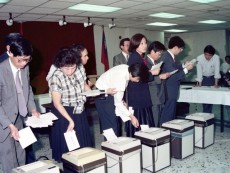 In every administration, there used to be a “Second Office of Personnel Administration” (abbreviated to Second Personnel Office) with an intelligence background. The Second Personnel Office maintained detailed files containing information on public servants, including their beliefs, personalities, and even trivial information about their lives, to control the behavior of public servants. Thus, these files were named the “Loyalty Files.” Despite constant denial from Second Personnel Office, unrelenting investigation from the councilmen finally exposed these files. Under supervision from the council, all of the “Loyalty Files” were requested for destruction. Beginning with the council itself, the files of the council hall employees were destroyed first, and the City Government followed by destroying their personnel files. The strict thought control of the past was finally brought to an end.
In every administration, there used to be a “Second Office of Personnel Administration” (abbreviated to Second Personnel Office) with an intelligence background. The Second Personnel Office maintained detailed files containing information on public servants, including their beliefs, personalities, and even trivial information about their lives, to control the behavior of public servants. Thus, these files were named the “Loyalty Files.” Despite constant denial from Second Personnel Office, unrelenting investigation from the councilmen finally exposed these files. Under supervision from the council, all of the “Loyalty Files” were requested for destruction. Beginning with the council itself, the files of the council hall employees were destroyed first, and the City Government followed by destroying their personnel files. The strict thought control of the past was finally brought to an end.
Fierce debate in academia over voluntary enrollment program in public hearing(1992/3/20)
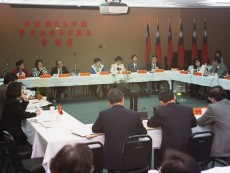 Taipei planned to be the first city to put the “Voluntary Enrollment to Senior High School for Junior High School Graduates” program into practice. The program aimed to replace senior high school entrance exams with junior high school grades as the standards for voluntary high school enrollment. This radical change in the system prompted the council to hold a public hearing, in which many scholars participated eagerly. The side in support of the measure criticized the opposing side as conservative and mistrustful of experts; the opposing side believed that voluntary enrollment was no different from the Joint Entrance Examination. Moreover, taking school grades into consideration would increase the stress put on students. The group formed by opposing scholars said that should the Department of Education decide to force the policy initiative, they would then continue monitoring for at least four years.
Taipei planned to be the first city to put the “Voluntary Enrollment to Senior High School for Junior High School Graduates” program into practice. The program aimed to replace senior high school entrance exams with junior high school grades as the standards for voluntary high school enrollment. This radical change in the system prompted the council to hold a public hearing, in which many scholars participated eagerly. The side in support of the measure criticized the opposing side as conservative and mistrustful of experts; the opposing side believed that voluntary enrollment was no different from the Joint Entrance Examination. Moreover, taking school grades into consideration would increase the stress put on students. The group formed by opposing scholars said that should the Department of Education decide to force the policy initiative, they would then continue monitoring for at least four years.
Enactment of the “Sunshine Law”
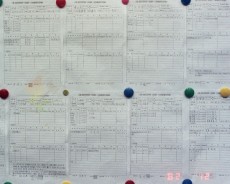
Religious conflict over fate of the Guan-Yin statue(1994/3/14)
 The planned renovation of the Taipei City Park No. 7 caused a dispute over whether the Guan-Yin statue in the park should be relocated. Buddhists believe that the Guan-Yin statue is a symbol of culture and art which should be kept. However, the Christians argued that based on the principle of religious equality, a symbol of a certain religion should not occupy public space. The two sides argued against each other in the public hearing, accompanied from time to time by applause from supporters listening in on the discussion. In the end, no consensus could be reached. The City Government promised to take opinions from both sides into consideration before making a decision. Note: In the end, the owner of the Guan-Yin Statue, the “Ta Hsiang Buddhist Association”, donated the statue as artwork to the Taipei City Government, who promised to keep it in the park forever.
The planned renovation of the Taipei City Park No. 7 caused a dispute over whether the Guan-Yin statue in the park should be relocated. Buddhists believe that the Guan-Yin statue is a symbol of culture and art which should be kept. However, the Christians argued that based on the principle of religious equality, a symbol of a certain religion should not occupy public space. The two sides argued against each other in the public hearing, accompanied from time to time by applause from supporters listening in on the discussion. In the end, no consensus could be reached. The City Government promised to take opinions from both sides into consideration before making a decision. Note: In the end, the owner of the Guan-Yin Statue, the “Ta Hsiang Buddhist Association”, donated the statue as artwork to the Taipei City Government, who promised to keep it in the park forever.
DPP council members taking oath outdoors(1994/12/25)
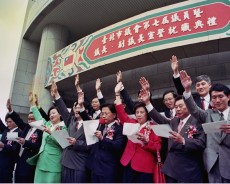 When the sixth term of the city council assumed office, to protest that the city mayor was not elected directly by citizens, DPP councilmen gathered outside the city council after the official oath taking ceremony. They then declared their self-prepared oaths to the citizens. The seventh term followed with tradition, despite the fact that the mayor had already been directly elected. With the exception of Lin Ruey-Tou and Chen Sheng-Hung, the other sixteen DPP councilmen took their own oaths outside the council hall gate in front of the citizens. Their oath was recited by DPP Director General Chou Po-Ya. To complete the official procedure, they still entered the council hall later and finished the official oath taking ceremony with councilmen from other parties.
When the sixth term of the city council assumed office, to protest that the city mayor was not elected directly by citizens, DPP councilmen gathered outside the city council after the official oath taking ceremony. They then declared their self-prepared oaths to the citizens. The seventh term followed with tradition, despite the fact that the mayor had already been directly elected. With the exception of Lin Ruey-Tou and Chen Sheng-Hung, the other sixteen DPP councilmen took their own oaths outside the council hall gate in front of the citizens. Their oath was recited by DPP Director General Chou Po-Ya. To complete the official procedure, they still entered the council hall later and finished the official oath taking ceremony with councilmen from other parties.
Chairman headaches over three party deadlock(1995/1/12)
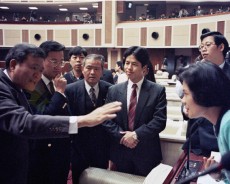 The seventh term saw the unprecedented situation of equal power between the KMT, DPP, and the New Party. Chairman Cheng Chien-Chih was greatly troubled. New Party and DPP councilmen erupted into violent physical conflict on the first day of the new session. Chen was criticized for being slow to respond and unable to prevent conflict. The chairman used to be on good terms with the other council members, who accepted his moderating habits, even if they do not conform to official protocol. The new members’ emphasis on proper procedures and rules made him awkward. He was forced to change his old style and requested time for adjustment.
The seventh term saw the unprecedented situation of equal power between the KMT, DPP, and the New Party. Chairman Cheng Chien-Chih was greatly troubled. New Party and DPP councilmen erupted into violent physical conflict on the first day of the new session. Chen was criticized for being slow to respond and unable to prevent conflict. The chairman used to be on good terms with the other council members, who accepted his moderating habits, even if they do not conform to official protocol. The new members’ emphasis on proper procedures and rules made him awkward. He was forced to change his old style and requested time for adjustment.
DPP requested KMT to remove its presence from the police force to separate the party from the government(1995/5/8)
 During its long administration, the KMT established party branches in many government administrations. During the hearing, DPP councilmen requested strongly that the KMT remove their “Liu Hang-Hsing” and “Liu Chung-Hsing” party branches from police force immediately, and that the policemen should resign from the party. The councilmen also indicated that the party fee of KMT policemen was allegedly paid by each sub department’s own operating fund. The City Police Department vehemently denied this accusation, stating that the “Liu Hang-Hsing” party branch was indeed established within the police bureau, but had already terminated all party related activities and was seeking to move to a new location. The request for policemen to quit the party could not be enforced, as there was no legal basis for such a request.
During its long administration, the KMT established party branches in many government administrations. During the hearing, DPP councilmen requested strongly that the KMT remove their “Liu Hang-Hsing” and “Liu Chung-Hsing” party branches from police force immediately, and that the policemen should resign from the party. The councilmen also indicated that the party fee of KMT policemen was allegedly paid by each sub department’s own operating fund. The City Police Department vehemently denied this accusation, stating that the “Liu Hang-Hsing” party branch was indeed established within the police bureau, but had already terminated all party related activities and was seeking to move to a new location. The request for policemen to quit the party could not be enforced, as there was no legal basis for such a request.
Organizational Blueprint of the Department of Cultural Affairs was rejected; council members pleaded the City Government to take advice(1996/1/23)
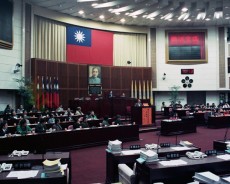 The City Government planned to establish a new Department of Cultural Affairs as a dedicated agency to manage and promote artistic and cultural activities. However, the organizational blueprint of Department of Cultural Affairs was rejected by the City Council. Deputy Mayor Chen Shih-Meng berated council members in anger, and caused strain between the City Government and the City Council. The City Council therefore held a public hearing to hear outside opinions. The participants agreed unanimously that the establishment of the Department of Cultural Affairs lacked public support, and reported that the City Government did not consult outside opinions during preparation. However, most people also agreed that an official administration would likely to be the most suitable solution at this juncture. The councilmen also emphasized that the council was not against the establishment of Department of Cultural affairs per se; they only hoped that the City Government would entertain opinions from people in the fields of arts and literature, and not to view the issue from a bureaucratic perspective.
The City Government planned to establish a new Department of Cultural Affairs as a dedicated agency to manage and promote artistic and cultural activities. However, the organizational blueprint of Department of Cultural Affairs was rejected by the City Council. Deputy Mayor Chen Shih-Meng berated council members in anger, and caused strain between the City Government and the City Council. The City Council therefore held a public hearing to hear outside opinions. The participants agreed unanimously that the establishment of the Department of Cultural Affairs lacked public support, and reported that the City Government did not consult outside opinions during preparation. However, most people also agreed that an official administration would likely to be the most suitable solution at this juncture. The councilmen also emphasized that the council was not against the establishment of Department of Cultural affairs per se; they only hoped that the City Government would entertain opinions from people in the fields of arts and literature, and not to view the issue from a bureaucratic perspective.
Blue collar tragedy: Dozens of MRT workers become victims of decompression sickness(1997/7/24)
 Dozens of MRT workers fell ill with decompression sickness due to potentially unsuitable working environments under high air pressure. In addition to the workers in the Xindian Line who fell ill in January and reached reconciliation with the contractor, other workers who fell ill were diagnosed only as “potential cases”. The contractor would neither compensate them nor allow them to work, thus depriving them of their means to sustain themselves. The workers appealed the case to both Taipei City Department of Rapid Transit Systems and Taipei City Council. In the end, the DORTS promised to hand over the ill workers’ medical records to related agencies for inspection, and would also coordinate for compensation.
Dozens of MRT workers fell ill with decompression sickness due to potentially unsuitable working environments under high air pressure. In addition to the workers in the Xindian Line who fell ill in January and reached reconciliation with the contractor, other workers who fell ill were diagnosed only as “potential cases”. The contractor would neither compensate them nor allow them to work, thus depriving them of their means to sustain themselves. The workers appealed the case to both Taipei City Department of Rapid Transit Systems and Taipei City Council. In the end, the DORTS promised to hand over the ill workers’ medical records to related agencies for inspection, and would also coordinate for compensation.
Chairman Chen Chien-Chih distributed video tapes of himself questioning the mayor(1997/11/10)
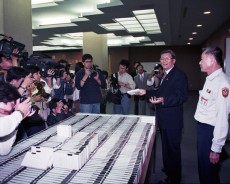 The relationship between the City Government and the City Council had been uneasy since the seventh term came into office. After several disputes, Chairman Chen Chien-Chih took to the podium as a councilman, and questioned Mayor Chen Shui-Bian about the multiple conflicts between the City Government and the City Council. The argument became the center of public attention. Chairman Chen also recorded the inquiry, and held a press conference to distribute video tapes to collegiate law departments, bar associations, and political parties. The chairman said that he had about 500 to 600 video tapes available, and planned to copy another 5,000 to 10,000 to distribute to the general public upon request.
The relationship between the City Government and the City Council had been uneasy since the seventh term came into office. After several disputes, Chairman Chen Chien-Chih took to the podium as a councilman, and questioned Mayor Chen Shui-Bian about the multiple conflicts between the City Government and the City Council. The argument became the center of public attention. Chairman Chen also recorded the inquiry, and held a press conference to distribute video tapes to collegiate law departments, bar associations, and political parties. The chairman said that he had about 500 to 600 video tapes available, and planned to copy another 5,000 to 10,000 to distribute to the general public upon request.
The City Government and the City Council disagreed over the abolishment of prostitution: The City Council vetoed the reconsideration case from the City Government for the first time(1997/12/17)
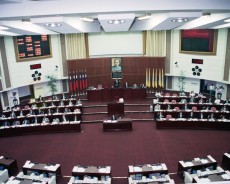 Originally, the City Government and the City Council had an agreement to terminate legal prostitution, and the City Government declared the policy according to the council resolution. Due to massive protests from legal prostitutes, however, the Council deemed that prostitution abolishment would be too rash. The council passed new regulations and scheduled the “Sunset Article” to give legal prostitutes two more years as a buffer. The City Government insisted on its original position to abolish.
Originally, the City Government and the City Council had an agreement to terminate legal prostitution, and the City Government declared the policy according to the council resolution. Due to massive protests from legal prostitutes, however, the Council deemed that prostitution abolishment would be too rash. The council passed new regulations and scheduled the “Sunset Article” to give legal prostitutes two more years as a buffer. The City Government insisted on its original position to abolish.
Text and images are provided by Taipei in the Making Project (Graduate Institute of Library & Information Science, National Chung Hsing University)
|




























